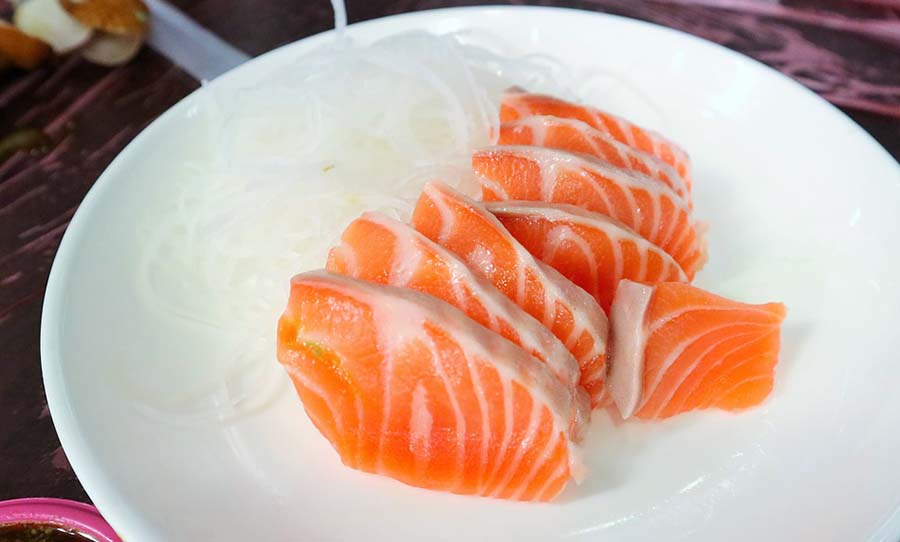It is very important to eat well while you are pregnant. However, it’s quite likely your appetite will change drastically throughout your three trimesters. Morning sickness, cravings, and the need to ensure you are getting plenty of nutrients will mean your diet will shift quite a bit during these exciting months.

There are some foods that can potentially harm you and your baby in the prenatal period. Here are nine foods to avoid during pregnancy.
That being said, there are some foods that you shouldn’t eat while pregnant. There is a range of reasons for this – mostly it is because you are more susceptible to particular bacteria, toxins, parasites and other nasties that may cause harm to you and your baby. Therefore, the key thing is to steer clear from food that has a higher risk of containing anything harmful.
Here are nine foods to avoid during pregnancy.
Undercooked or Raw Fish or Meat
Raw fish may pose the risk of infection from multiple bacteria, such as Vibrio, Salmonella, Listeria, as well as norovirus and parasites. If you are pregnant you are especially susceptible to Listeria infections.
Raw shellfish, such as oysters and clams, may contain Vibrio bacteria and should be avoided too. To be safe, it is a good idea to avoid shellfish completely.
These may not only harm you – they can also affect your baby and be very serious.
The same goes for raw or undercooked meat. Infections may be caused by Toxoplasma, E. coli, Listeria and Salmonella.
Pâté
Pâté can contain Listeria, and should be avoided in all its forms. Liver products, such as pâté and liver sausage, also contain large amounts of vitamin A, which can be harmful to your baby.
Sprouts
Avoid all types of sprouts, as these can contain Salmonella. This includes alfalfa sprouts, broccoli sprouts, onion sprouts, sunflower sprouts, clover sprouts, radish sprouts, snow pea sprouts, mung beans and soybean sprouts.
Unpasteurised Dairy Products
Unpasteurised milk and cheese can contain harmful bacteria such as Listeria, Salmonella and E. coli. Therefore pregnant women should only eat and drink pasteurised dairy products. This process kills off bacteria while not changing the nutritional value. So-called “raw milk” products are banned for human consumption in Australia. If a product’s label states that it is not for human consumption, it should not be consumed, despite what the vendor may tell you, because of the very real risk of harm to yourself and your baby.
Some soft cheeses, such as brie, feta and camembert, are made from unpasteurised milk and should be avoided. Stick to hard cheeses.
Raw Eggs
Raw eggs can contain Salmonella. It’s important that you make sure your eggs are cooked all the way through and that you don’t eat products that contain raw egg (such as “chef’s mayonnaise” for example).
Some Kinds of Fish
There are some kinds of fish that are at risk of containing high levels of mercury, which can be harmful to your baby. These are usually long lived varieties caught in polluted waters, such as shark (flake), broadbill, king mackerel, marlin, swordfish and some kinds of tuna (such as albacore tuna). They accumulate high levels of methyl mercury (not to be confused with ethyl mercury which does not bioaccumulate). These kinds of fish should be consumed no more than once or twice a month.
However, not all fish are at risk of being high in mercury, and these are very good for you. Salmon, trout, barramundi, snapper and John Dory are all high in omega-3 and could be consumed 2 to 3 times a week.
Pre-Packaged or Premade Salads
Premade salads, like those from a salad bar or buffet, as well as pre-packaged salads, are at a higher risk of being contaminated by Listeria, so avoid them!
Processed Meats
Processed meats like salami, ham, chorizo, hot dogs, and pepperoni (lunch meats and deli meats) have a small risk of containing various bacteria and should be avoided (these are also not the healthiest option – opt for lean meats like chicken instead).
Unwashed Produce
The soil on unwashed fruit and vegetables may contain Toxoplasma, E. coli, Salmonella and Listeria, therefore you should never eat produce that has not been cleaned thoroughly.
A Note on Caffeine and Alcohol
It is recommended that you limit your caffeine intake to less than 200 mg per day, which is roughly 2 to 3 cups of coffee, depending on the strength.
As for alcohol, no amount is safe. You should steer clear of alcohol completely.
If you have any questions about foods to avoid during pregnancy or any other questions about your baby, please don’t hesitate to get in touch.
Dr Bevan Brown is one of the most trusted obstetricians in Sydney. Personalised care and strong relationships with our patients is of utmost importance!